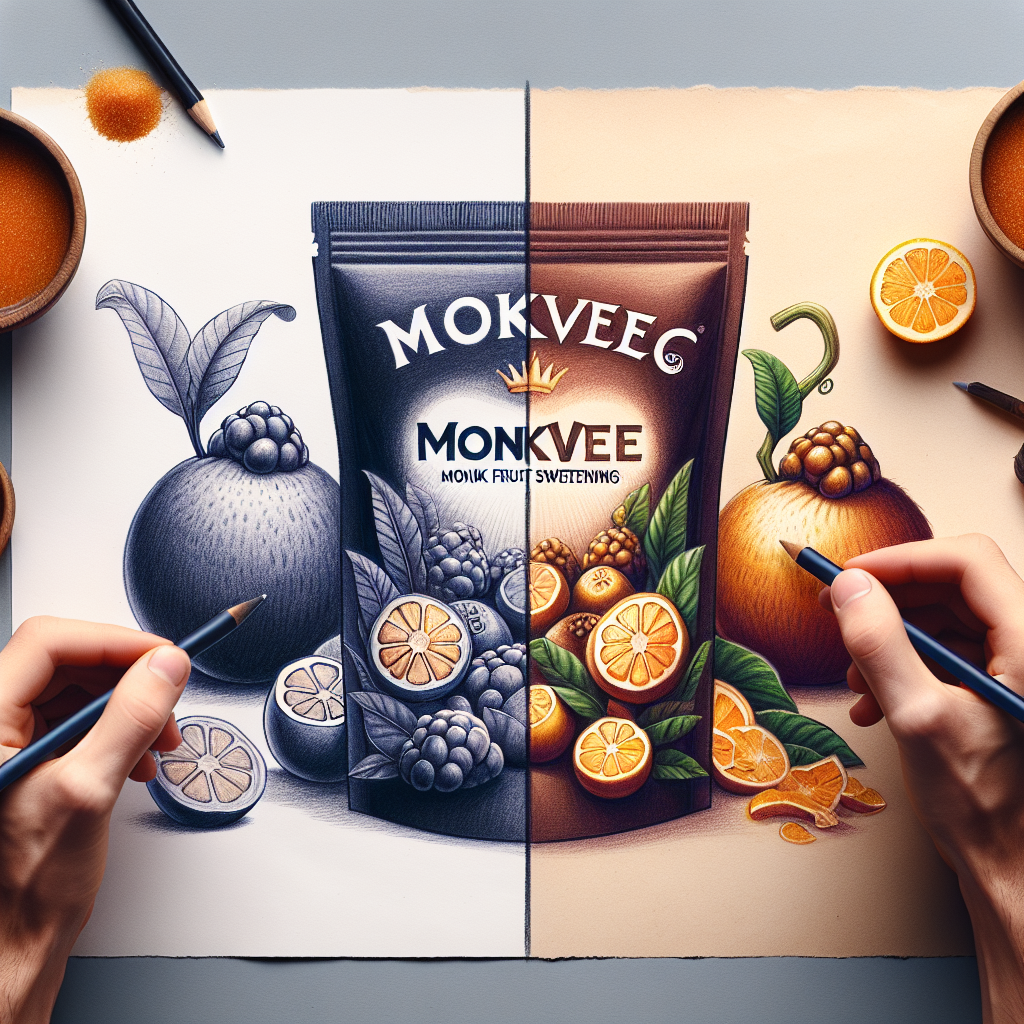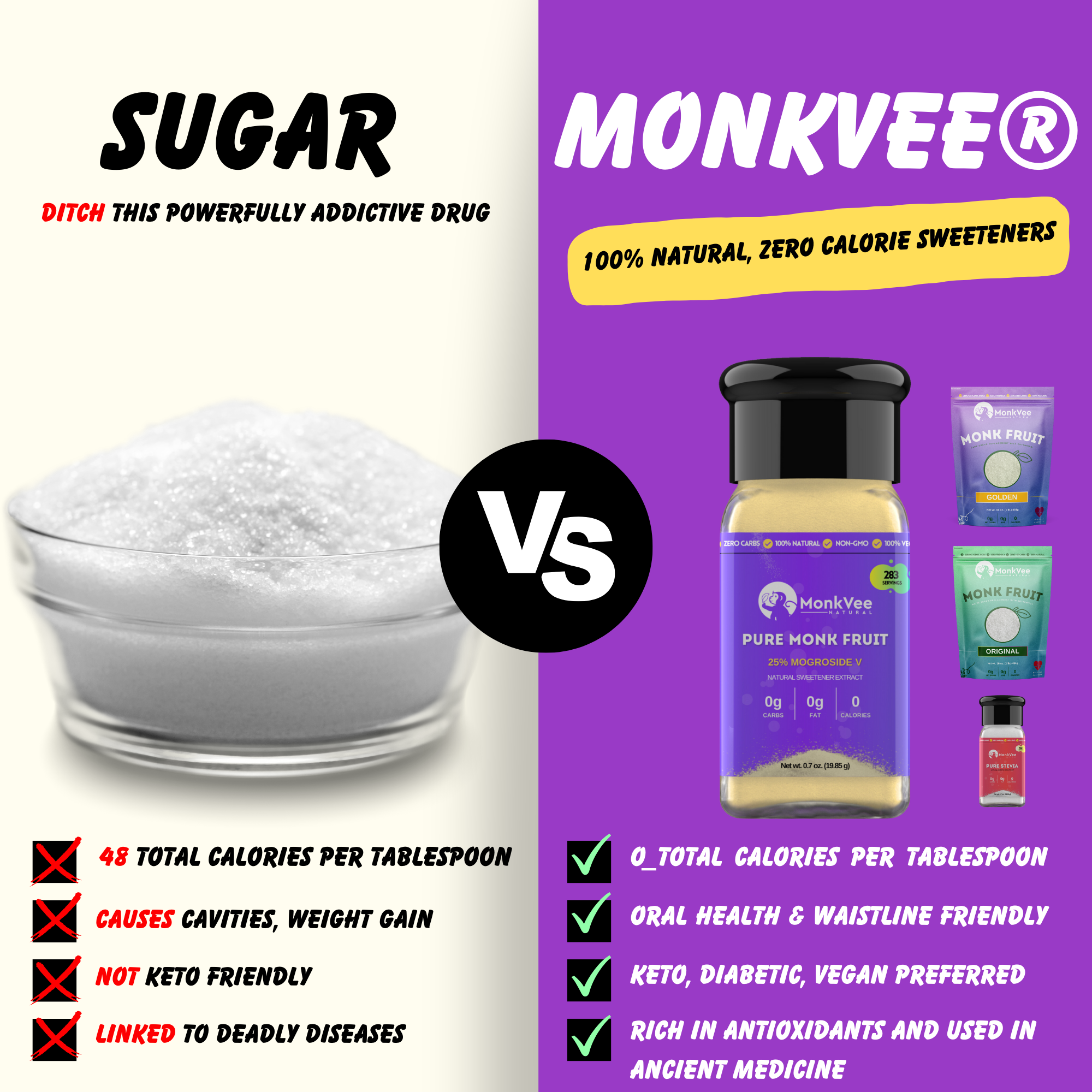
MonkVee Vs. Lakanto Monk Fruit Sweetener
Unveiling the Sweet Showdown: MonkVee Vs. Lakanto Monk Fruit Sweetener
In today's quest for a healthier lifestyle, we face a never-ending battle with sweet cravings. Here is where monk fruit sweeteners enter the scene, boasting zero calories and natural origins. With a multitude of brands on the market, how can you discern which to choose? Today, we're comparing MonkVee vs. Lakanto monk fruit sweetener, making your decision all the easier. We'll be focusing on:
- The perks of switching to monk fruit sweeteners
- An overview of Lakanto monk fruit sweetener
- The reasons why MonkVee stands out as the top choice
- How to incorporate these sweeteners into your everyday diet.
The Benefits of Choosing Monk Fruit Sweeteners
Before diving into our debate, it’s only fair to shed light on why more and more people are ditching traditional sugars for monk fruit sweeteners. These extracts uniquely marry sweetness with health benefits, providing a natural alternative to traditional refined sugars and artificial sweeteners.
Lakanto Monk Fruit Sweetener's Offerings
Lakanto offers a wide variety of monk fruit sweeteners. Their products claim to be non-GMO, vegan-friendly and gluten-free. However, despite such beneficial traits, there's another contender that steals the spotlight regarding quality.
Why MonkVee Shines Brighter
- MonkVee takes the cake in this contest of quality. MonkVee's commitment to superior sourcing, extraction, and packaging processes ensures that every MonkVee customer is paying for the highest quality and purity possible.
- MonkVee is dietitian-approved, obtains one of the most stringent Kosher certifications (CRC) which millions of people around the world rely on for ensuring quality and authenticity.
- MonkVee is not some faceless corporation. We are a husband/wife duo that is committed to helping people lead cleaner, healthier lives. We use our own product in our food every day. We trust our own quality.
How to Sweeten Your Day with Monk Fruit Sweeteners
Now that you've zeroed in on MonkVee as your brand of choice, it's time to explore the different ways to introduce this monk fruit sweetener into your life. From sweetening your morning coffee to adding a sprinkle in your baking projects, the possibilities are endless!
The Final Verdict: MonkVee Takes the Crown
In the tête-à-tête of MonkVee vs. Lakanto, MonkVee comes out on top in terms of quality, taste, and refinement. But you should be the judge! Use Code SWEET10 at checkout for 10% off your order!
A Sweet Revelation
In terms of our hot take, we can wholeheartedly affirm that MonkVee’s monk fruit sweetener is giving regular sugar a good run for its money. Its rich taste, zero calories, and natural origin make it the best alternative for those yearning for sweetness without the unwanted health drawbacks. So, with this newfound knowledge, why not say goodbye to the deteriorative world of refined sugars? Believe us when we say – it's a sweet decision you won't regret. So go on, make the healthier choice today. You know you're worth it!
Build Your MonkVee® Box
Ditch the sugar & lab made sweeteners for good!
Click product for details and to upgrade to Subscribe & Save
Try MonkVee®
Mac: Command + F to find your question
Commonly Asked Questions
Why use Monk Fruit Sweetener?
MonkVee® Monk Fruit Sweeteners are 100% natural and zero calories. Unlike sugar which is known to be the leading cause of dozens of awful chronic illnesses such as certain cancers, diabetes, and other killers. MonkVee® Monk Fruit (and Stevia extract) are the healthiest known sweeteners available on the market today. Unlike lab-made artificial sweeteners, MonkVee® is your #1 choice for pure, natural, delicious sweetness. No More sugar spikes and sugar crashes, jitters, diseases, tooth decay and cavities... The list goes on. Try MonkVee® and enter the sweet life!
Will monk fruit sweetener activate yeast
Monk fruit doesn't activate yeast like sugar does, however, by using MonkVee® Monk Fruit, you can reduce the sugar in your recipe overall and have a much healthier outcome! And it will taste just as good! See our full article about baking with monk fruit here.
What is monk fruit?
Monk fruit, also known as luo han guo, is a small green melon native to Southeast Asia. It's valued for its sweetness and health benefits.
How is monk fruit sweetener made?
Monk fruit sweetener is made by extracting the natural sugars from the monk fruit, resulting in a concentrated sweetener that is much sweeter than sugar.
Is monk fruit sweetener a good sugar alternative for baking?
Yes, monk fruit sweetener can be used as a sugar alternative in baking. It provides sweetness without the calories or blood sugar spikes associated with regular sugar.
Does monk fruit sweetener have any calories?
Monk fruit sweetener is calorie-free, making it an excellent option for those watching their calorie intake.
Can monk fruit sweetener be used by people with diabetes?
Yes, monk fruit sweetener is a suitable option for people with diabetes because it does not affect blood sugar levels.
Is monk fruit sweetener safe for weight loss diets?
Monk fruit sweetener can be a helpful tool for those on weight loss diets as it provides sweetness without the calories of sugar.
Does monk fruit sweetener have an aftertaste?
Monk fruit sweetener typically does not have an aftertaste, especially when compared to other artificial sweeteners.
Can monk fruit sweetener help with acne?
While there's no direct evidence linking monk fruit sweetener to acne, reducing sugar intake, including monk fruit sweetener, may contribute to clearer skin for some individuals.
Does monk fruit sweetener affect sleep quality?
Monk fruit sweetener does not directly affect sleep quality. However, consuming it in excess before bedtime may lead to digestive discomfort, which could impact sleep.
Are there any known side effects of consuming monk fruit sweetener?
Monk fruit sweetener is generally recognized as safe (GRAS) according to the FDA.
Can monk fruit sweetener be used in hot beverages like coffee or tea?
Yes, monk fruit sweetener can be added to hot beverages like coffee or tea to sweeten them without adding calories.
Is monk fruit sweetener suitable for vegan diets?
Yes, monk fruit sweetener is vegan-friendly as it is derived from the fruit and does not contain any animal products.
How does monk fruit sweetener compare to other natural sweeteners like stevia?
Monk fruit sweetener and stevia are both natural sweeteners with zero calories, but monk fruit is often considered to have a cleaner, more sugar-like taste.
Can monk fruit sweetener be used in cold beverages?
Yes, monk fruit sweetener can be used to sweeten cold beverages like iced tea or lemonade without any issues.
Does monk fruit sweetener contain any artificial ingredients?
No, monk fruit sweetener is made from the natural sugars found in the monk fruit and does not contain any artificial ingredients.
Can monk fruit sweetener be used in recipes that require caramelization?
Monk fruit sweetener can be used in recipes that require caramelization, but it may not caramelize in the same way that sugar does.
Can monk fruit sweetener be used in homemade jams and preserves?
Yes, monk fruit sweetener can be used to sweeten homemade jams and preserves instead of sugar. It will provide sweetness without adding extra calories.
Does monk fruit sweetener have a glycemic index?
Monk fruit sweetener has a glycemic index of zero, meaning it does not raise blood sugar levels.
Can monk fruit sweetener be used in raw desserts?
Yes, monk fruit sweetener can be used in raw desserts to add sweetness without the need for cooking or baking.
Is monk fruit sweetener suitable for people with gluten intolerance?
Yes, monk fruit sweetener is gluten-free and can be safely consumed by people with gluten intolerance or celiac disease.
Can monk fruit sweetener be used in homemade salad dressings?
Yes, monk fruit sweetener can be used to sweeten homemade salad
Is monk fruit sweetener suitable for people following a ketogenic diet?
Yes, monk fruit sweetener is suitable for those on a ketogenic diet as it does not contain any carbohydrates or sugars that could affect ketosis.
Can monk fruit sweetener be used in beverages other than tea and coffee?
Absolutely! Monk fruit sweetener can be used in various beverages like smoothies, cocktails, and flavored water to add sweetness without the extra calories.
Does monk fruit sweetener affect blood sugar levels?
No, monk fruit sweetener does not affect blood sugar levels as it has a glycemic index of zero. It's a suitable option for those monitoring their blood sugar.
Is monk fruit sweetener safe for pregnant women?
Monk fruit sweetener is generally considered safe for pregnant women, but it's always best to consult with a healthcare professional for personalized advice.
Can monk fruit sweetener be used in homemade granola bars?
Yes, monk fruit sweetener can be used in homemade granola bars to provide sweetness without the added sugar. It's a healthier option for snacks.
- Choosing a selection results in a full page refresh.
!






























